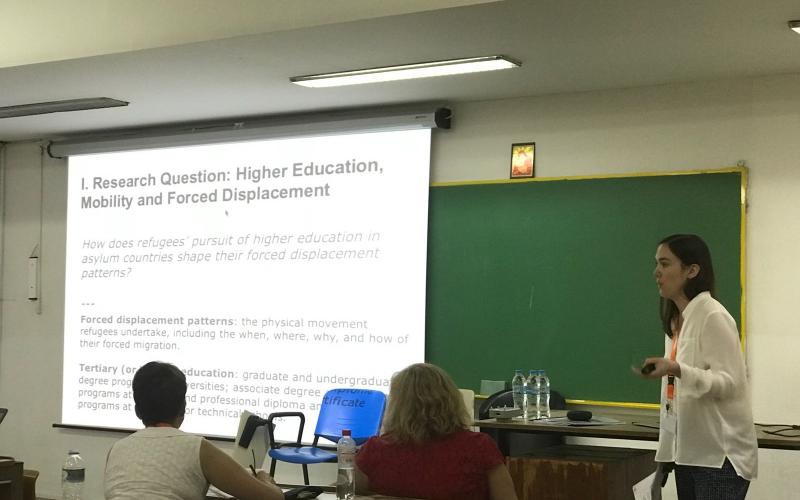CELL's Principal Ayla Bonfiglio presented her research on how higher education impacts when, where and how refugees seek asylum at this year's Internation Association for the Study of Forced Migration conference in Thessaloniki, Greece from 24-27 July 2018. Her presentation was part of a panel on refugee higher education, called 'Between Camp and Campus: Mapping the Field of Higher Education in Refugee Protection.'
Panel Description
The role of highereducation in refugee protection is highly contested. On the one hand, access to higher education is promoted as a tool for refugee protection and integration, and as a way for refugee students and their families to become self-sustained. Various actors, including universities and policy-makers, have therefore expressed their commitment to increase participation of asylum seekers and refugees in higher education. On the other hand, asylumseekers and refugees who want to access higher education are regularly confronted with numerous obstacles and forms of exclusion, partly because higher education initiatives and policies do not follow a coherent approach as regards the participation of forced migrants. This panel brings together researchers, practitioners and refugee students to spur a debate about the often divergent strategies, priorities and practices of actors involved in the provision of higher education to forced migrants. The papers discussed will use higher education as a vantage point from which to engage with conceptual debates about refugees’ resilience and choice, transitions and pathways, as well as mobilities and immobilities.
Presentation Abstracts
The far-reaching higher education in refugee protection
Nina Weaver, Director of Refugee Education Programs at Southern New Hampshire University (SNHU), UK
Sadiki Bamperineza, Student at SNHU, UK; former teacher in Kiziba refugee camp, Rwanda
Pascaline Ingabire, Student at SNHU, UK; former teacher in Kiziba refugee camp, Rwanda
This presentation will explore the role of higher education in protection by focusing on a case study of a higher education program for refugee students and their communities in Kiziba refugee camp, Rwanda. Speakers in this presentation will share findings from a recent impact evaluation that measures the indirect effects of higher education initiatives on primary and secondary educational outcomes, using data collected from surveys and UNHCR’s education partner in Kiziba refugee camp. Often higher education is overlooked in humanitarian responses that tend to prioritise primary and secondary education. This research argues for the inclusion of pathways to higher education as an important part of humanitarian response, highlighting broader indirect effects on protection and educational outcomes. This study finds that increased availability of higher education opportunities and the visibility of the program in Kiziba refugee camp has led to improvement in refugees’ belief in the value of education, thereby increasing enrollment and attendance outcomes at primary and secondary school levels. In addition, higher education and other tertiary education programs can play an important role in improving quality of teaching at primary and secondary school levels through the inclusion of teachers in higher education programs. Two of the panelists will also offer qualitative insights into the role of higher education for refugee protection and the importance of access to higher education for improved life and employment outcomes, drawing on their experiences both as refugee students in a higher education program and as former secondary school teachers within the camp.
Understanding refugee agency and mobility patterns through higher education
Ayla Bonfiglio, Principal, Conflict and Education Learning Laboratory (CELL); Doctoral Fellow, Maastricht Graduate School of Governance and UNU-MERIT
The literature on refugee higher education is dominated by program evaluations, most often of universities within developed, resettlement country contexts. There are, however, a growing number of studies that examine the experiences of refugees who attempt to access and pursue tertiary education. While not the focus of these studies, they nevertheless reveal that higher education can be linked to specific displacement patterns related to educational mobility during displacement, access to resettlement and other durable solutions, as well as greater wellbeing and integration during displacement. These studies also link the attainment of higher education to refugees’ increased agency. This paper examines how refugees’ pursuit of higher education can help us understand how they express their agency in shaping their displacement patterns and accessing protection. Using Bakewell and Bonfiglio’s (2013) agency and mobility framework as a point of departure, this study analyzes more than 100 semi-structured interviews with Somali and Congolese refugees and migrants who are living in Kenya, Uganda, and South Africa on their education and displacement trajectories. Briefly, this paper finds that respondents expressed their agency through higher education in determining the timing of their displacement, the destination, the channels of movement, and the modes of movement.
The necessary conditions for successful transitions to higher education for refugee background students
Misty Adoniou, Associate Professor in Language, Literacy and TESL, University of Canberra, Australia
I present the combined work of five Australian academics working across three university campuses who conducted a two year study of young refugee background students transitioning from schools to universities in urban, suburban and rural contexts in Australia. The study was conducted to investigate the low numbers of refugee students completing higher education studies in Australia, despite their high aspiration levels to complete university in their secondary school years. In short, we identified the need for schools and universities to reconceptualise transition as a holistic process which extends beyond classroom walls, and to actively build upon the resilience and assets refugee background students bring to learning. We pursued a narrative methodology enabling us to listen to their voices and thus understand the barriers, challenges and opportunities that faced them. For those who successfully made the transition, we listened to what their experiences had been. Their voices, from Afghanistan, Burma, Democratic Republic of Congo, Ghana, Iran, Iraq, Jordan, Nepal, Pakistan, Sierra Leone, and Sri Lanka provide the context for the presentation. The lessons the researchers learned about the conditions for successful transitions into higher education provide the framework for the presentation. Strategies for actively engaging in an assets-based approach are also shared.
The Role of Universities as Sites of Inclusion in Contexts of Exclusion
Rebecca Murray, Doctoral Fellow, Department of Geography, University of Sheffield, UK
This paper explores the challenges and opportunities encountered by universities, in the process of providing access to their campuses, in the country in which a claim for asylum has been submitted. The specific concern addressed relates to monitoring undertaken by the state, in respect to the implementation of managed migration policies, and widening access and the participation of under-represented groups in the sector. Higher education institutions (HEIs) are frequently presented by the state as autonomous bodies, although their freedom is often secured through their compliance with legislation and policy, whilst subject to intensive state surveillance. Universities are effectively governed from a distance by the state through networks of power: defined as ‘paths of connection’ between the state, civil society and the population (Dean, 2010:45), which allow power to be exercised in a ‘distant and calculative manner’ (Legg, 2005:139). Managed migration regimes seek to exclude forced migrants, which directly contrasts with the growing number of initiatives delivered by universities that seek to include forced migrants. Key questions arise in terms of how these paths of connection between the state, HEIs and agents operating within the higher education sector function to either reproduce or resist structures. This is predicated either upon their focus to reproduce structured derived from the dominant political ideology of exclusion, or exercise their autonomy to restructure higher education in order to accommodate the aspirations and ambitions of forced migrants. The paper will conclude by reporting on the successes of HEIs who have effectively exercised their discretion to create a context of inclusion as opposed to exclusion for forced migrant students.
Panel Organizers
Andrea Kobel, Research Associate, Institute for Innovation and Technology
Eveliina Lyytinen, Senior Researcher, Migration Institute of Finland (MIF)

